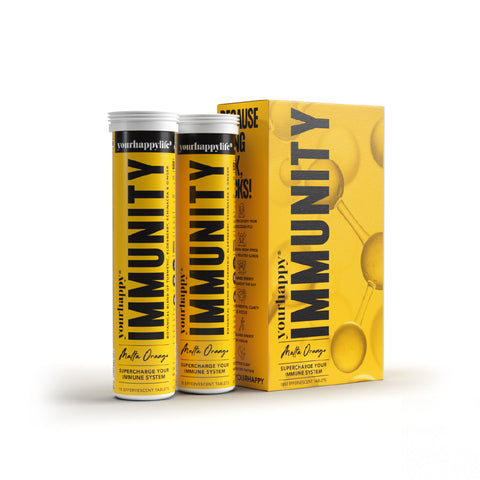News
What About The Possibility Of Immunomodulatory Effects From The Food We Eat?

Due to the increasing recognition of the role diet plays in one's health and well-being, there has been a significant rise in research into the immunomodulatory effects of food. As a result, many people are interested in finding ways to strengthen their immune systems through diet. Using food to modify the immunological response appeals to many people.
According to recent research, fruits, vegetables, whole grains, and probiotics have immunomodulatory benefits. Let's discover the fundamental facts.
What Is Immunomodulatory?
The term "immunomodulatory" describes a substance's ability to regulate or modulate the immune system's response. The immune system protects the body from foreign invaders such as viruses, bacteria, and other infections.
Immunomodulation changes the immune system's natural function to fight infections or prevent overreactions and autoimmune responses. This can be accomplished by using medicines, biological therapies, or dietary modifications.
A substance's immunomodulatory effects can be understood in terms of its capacity to alter the immune response. These include immune cells, cytokines, and other signaling molecules, the activity of which can be boosted or suppressed to achieve the desired effect.
Also Read: Why Is It Important To Have A Healthy Immune System
Can Food Modulate Immunity?
Food can have immunomodulatory effects, altering and controlling immune system activity. There is growing evidence that specific nutrients and dietary components regulate the immune response and can promote or suppress the immune system.
Food can affect the immunological response in several ways:
- Nutrients: Certain vitamins, minerals, and antioxidants in fruits and vegetables have been demonstrated to boost immunity and protect against illnesses. Vitamin C and zinc, for example, are essential for the proper functioning of the immune system. At the same time, a diet rich in antioxidants has been associated with a lower risk of chronic diseases.
- Probiotics and Prebiotics: Probiotics are live bacteria present in certain fermented foods, such as yogurt and kefir, and are considered immune-boosting properties. Prebiotics are nondigestible fibers that stimulate the formation of healthy gut bacteria, which can also influence the immune system.
- Fatty acids: Fatty acids, especially omega-3 fatty acids, have been demonstrated to have anti-inflammatory properties and control immune system activity. Omega-3 fatty acid-rich diets are associated with a lower risk of chronic illnesses and a stronger immune response.
- Phytochemicals: These are plant-based substances with anti-inflammatory and immunomodulatory properties. Some phytochemicals, such as the resveratrol found in red wine, have been demonstrated to boost the immune response. In contrast, others, such as the lectins found in some plants, can decrease the immunological response.
Diet and immunity are complex, and additional research is needed to understand their impacts thoroughly. Before making significant diet changes, consult a doctor because people respond differently to food.
Also Read: Importance Of Immunity And Factors Affecting It
Factors Can Impact Food's Immunomodulatory Effects
Several factors, including:
- Age, genetics, and overall health affect each person's immune system. Thus their reactions to food will vary widely.
- How much and how often you eat immunomodulatory foods can significantly affect how well they work. For example, excessive doses of vitamin C or zinc can have toxic effects, whereas smaller doses may have little impact on the immunological response.
- Interactions with other factors, such as stress, sleep, and exercise, can all modulate the impact of diet on immunity. If a person is under chronic stress, a diet heavy in omega-3 fatty acids may not help their immune system.
- The immune-modulating effect of food can also be affected by the presence of other nutrients and dietary components. Vitamin C, for example, has been shown to improve iron absorption from plant sources, while studies have linked trans fats to a reduced immunological response.
- The preparation and processing of foods can impact their immunomodulatory effects. For example, cooking or processing may diminish the content of some nutrients, whereas fermentation can enhance the concentration of probiotics.
The complicated interaction between food and the immune system makes it challenging to define the appropriate dietary interventions for various groups. More research is needed to understand food's immunomodulatory actions.
Also Read: Natural Ways To Increase Body Immunity Power
Immunomodulatory Effects Of Immune-Boosting Diets Include:
-
Vitamin C:

You probably already know that vitamin C has several possible immunomodulatory effects due to its antioxidant properties, capacity to boost immune cells' function, and role in influencing the adaptive immune response. Numerous chronic diseases, including cancer, cardiovascular disease, and autoimmune disorders, have been related to oxidative stress, making this a crucial topic. Vitamin C may reduce inflammation and boost immunological function by scavenging free radicals.
Vitamin C has also been proven to boost the performance of phagocytic cells like neutrophils and macrophages, which are essential to the immunological response. These cells are responsible for ingesting infections and eliminating cellular waste. In addition, the immune response is regulated by cytokine signaling molecules, and vitamin C may boost their production.
-
Probiotics:

Certain beneficial bacteria interact with the immune system, which may explain probiotics' immunomodulatory effects. In addition, probiotics emit immunomodulatory metabolites and other substances. Here are a few examples:
- Short-chain fatty acids (SCFAs): When probiotics ferment fiber in the gut, they produce short-chain fatty acids (SCFAs). SCFAs have been found to regulate the immune response by lowering inflammation and increasing immune cell growth.
- Lactic acid: Probiotics produce lactic acid, which lowers gut pH and inhibits dangerous bacteria. It has also been demonstrated that lactic acid has immunomodulatory effects by lowering inflammation and encouraging the growth of immune cells.
- Bacteriocins: Probiotics can produce and release bacteriocins, which are tiny antibacterial proteins. By suppressing the growth of pathogenic bacteria in the gut, bacteriocins can help modulate the immune response.
- Anti-microbial peptides: Probiotics can create and release antimicrobial peptides, which are antimicrobial and anti-inflammatory small proteins. These peptides can modulate the immune response by decreasing inflammation and encouraging the growth of beneficial microorganisms.
In addition, individual responses to nutrients like vitamin C, probiotics, and other nutrients may differ based on variables such as general health, genetics, nutrition, and other aspects of lifestyle.
Also Read: Do Children Need Supplements To Boost Their Immunity?
The Takeaway

YourHappy Immunity (Fizz)
Key Benefits
- Daily Protection & Well Being
- Faster Recovery From Cold/Cough/Flu & Sore Throat
- Protection from Stress & Travel Related Illnesses
- Sustained Energy Through the Day
- Improved Mental Clarity & Focus
Immunomodulation is a promising area of research for developing new methods for treating and preventing various diseases, ranging from infections to autoimmune disorders. However, immunomodulatory effects depend on the medication, dose, duration, and mode of administration. Therefore, it's important to remember that immunomodulation mechanisms, optimal doses, and administration techniques for individual groups require more research. Every day, supercharge your immune system with India's Best Immune Booster,
FAQ
How do the foods we eat affect our immune system?
An immunomodulatory or immunosuppressive medicine that may help the body fight cancer, infections, and other diseases.
Why are immunomodulators so essential?
Immunomodulators reduce inflammation by regulating immune system activity. Immunomodulators often prevent immune suppression in organ transplantation and autoimmune diseases like rheumatoid arthritis.
What types of immunomodulators are available?
Immune system modulators include cytokines, BCG, and immunomodulating medications. White blood cells secrete proteins known as cytokines into the bloodstream. They help the immune system combat cancer and regulate immune responses.
What are some examples of immunomodulatory drugs?
Some examples of immunomodulatory drugs include corticosteroids, immunosuppressants, immunostimulants, and monoclonal antibodies.





































